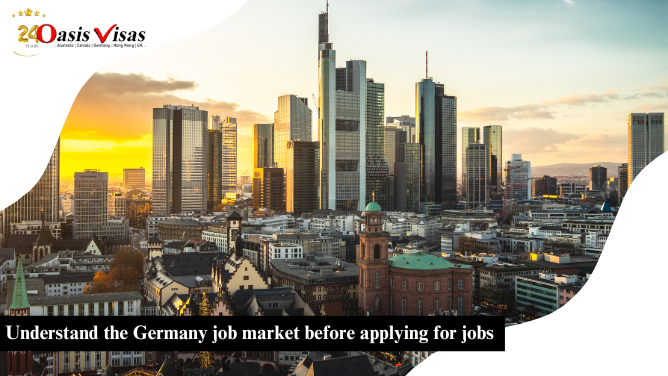
Germany is also the most favorable destination for a variety of skilled professionals around the world. The Germany job market offers great opportunities to attract strong talent through a strong economy, promise for high levels of living standards, and an open working environment. At present, over 2 million positions are available for candidates in cities like Berlin, Frankfurt, and Munich, leading the compensation table. This article gives an overall guide on how to better maneuver through the Germany job market available jobs, average salaries, visa requirements, and most importantly, how to apply.
Overview of Germany job market
The economy of Germany is stable, with a rising GDP growth of 2.5%. In contrast, unemployment figures stand at a remarkably low level between 3.4% and 3.93%, making it one of the safest employment regions in all of Europe. With 447,055 immigrants going to be admitted, Germany also shows openness towards foreign talent.
The immigration policies of Germany are highly favorable to skilled workers, such as healthcare, engineering, IT, and finance. Attractive for job seekers everywhere due to the strong focus of equal employment opportunities coupled with a very high-quality work environment, understanding how the Germany job market works will enable applicants to make informed decisions and improve their odds for securing the jobs they apply for.
Highest Demand Jobs in Germany’s Job Market
Several sectors in Germany are experiencing significant skill shortages, offering ample opportunities for immigrants:
- Nursing & Healthcare
Aging people in Germany make up a large population. Healthcare professionals such as nurses, doctors, and allied health professionals are needed for senior citizens, and there is an increasing need to manage healthcare. However, one needs to be a German language proficient person and also need to obey the rules that have been set by the German Ministry of Health. There are also very rewarding careers for eligible professionals having recognized qualifications in this field.
- Engineering
Engineering remains a high employer in the German job market. Mechanical, electrical, and civil engineers continue to attract much attention. Infrastructure projects are mainly in demand by Germany’s construction sector. There will be research, development, and project management opportunities for foreign engineers in this field. Recognition of the foreign qualifications or relevant experience may be needed.
- Aviation
Some of the internationally employed personnel in different sectors of the aviation industry include aircraft technicians, maintenance engineers, and mechanics. In general, such jobs have attractive packages and opportunities to move ahead in your career. Candidates with appropriate skills and qualifications can count on getting good jobs here
- IT Industry
Germany has some of the world’s leading IT and software companies. In Germany job market the demands are IT professionals such as software developers, cybersecurity analysts, and web developers. An undergraduate degree from a country whose professionals are respected may avail one for lucrative positions; however, many IT jobs lead to permanent residence-thence much more attractive.
- Finance & Insurance
High-paying jobs with job security are available in the finance and insurance industries in Germany. Graduates of any recognized institution, with experience in any of the aforementioned fields, can easily find work in banking, investment, and insurance. The group is very meticulous about accuracy and expertise, and skilled members are highly sought after.
- Business Analytics & Account Management
Data analysts and account managers are the most sought after industries. Then, business or finance-related studies and experience are above par. These jobs often come with competitive salary opportunities and opportunities for growth.
Average Salaries in the Germany Job Market
It is essential to be wise on the job market in the Germany job market concerning the average salary one expects to get per year. Here is some average annual salaries in some of the key sectors:
| Industry | Average Salary per Annum |
| Nursing | Up to €45,522 |
| Engineering | Up to €64,532 |
| Architecture | Up to €75,621 |
| IT Industry | Up to €40,000 |
| Finance and Insurance | Up to €48,750 |
| Aviation | Up to €34,950 |
| Business Intelligence | Up to €50,880 |
| Accounting | Up to €44,888 |
| Banking | Up to €40,800 |
Note: Salaries may vary due to the location, company, and experience of the individual.
Kinds of German Work Visa
Non-EU/EEA natives require a work visa to remain in the country for over 90 days. The common sorts of residence permits are:
- Residence Permit-Temporary Resident Visa: For temporary work, the duration of which is not more than the time period of that project.
- The EU Blue Card: For very skilled professionals with a recognized degree, having an employment offer fulfilling the minimum requirement of salary.
- Permanent Settlement Permit: Given to long term residents as they might have been residing and working in Germany for more than five years.
- EC Long Term: Residence Visa is awarded to that individual who has been running a residence permit for five years and qualifies for it.
Requirements for a German Work Visa
Applying for a work visa in Germany requires proper documentation:
- Valid Passport: Your passport should be valid throughout your stay in Germany.
- Completed Visa Application Form: Fill out the form accurately and completely.
- Passport-Sized Photos: Recent, biometric photos are required.
- Proof of Employment: Provide a contract or offer letter from a German employer.
- Declaration of Employment: A document outlining the terms of employment.
- Registration Certification: Proof of address in Germany.
Steps to Obtain a German Work Visa
- Job Offer: You receive a formal offer from your German employer. Getting a job is the starting point for the entire process of application.
- Review Visa Requirement: Familiarize yourself with specific requirements, depending on your visa type, as various types of visa may have different criteria.
- Preparation of Documents: Gather all the documents issued by the relevant authorities, such as your passport, application form, employment contract, and any certificate required.
- Pay the Visa Fee: Pay the processing fees. The amount payable depends on the type of visa.
- Attend the Interview: Schedule and attend an interview at the German consulate or embassy. You may be asked about your job offer, qualifications and plan for your stay in Germany
- Wait for consideration: Following the interview, the application is seen to, and you will be informed of the decision reached.
Skilled immigrants would find exciting opportunities in Germany job market. There are 2 million open jobs with attractive salaries available in healthcare, engineering, IT, and finance sectors. This kind of knowledge about the dynamics of a job market, in-demand roles, and the requirements on visa holders can increase your chances of finding employment.
Germany’s liberal immigration policies, a better work environment, and a sound economy drive the country as a very attractive place for career advancements. Proper preparation and matching of skills with market requirements can unlock rich rewards in the dynamic Germany job market.








